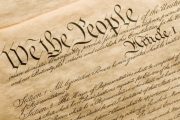On Tuesday the Supreme Court will hear arguments from Paul Clement, the lead attorney in Bond v. United States, that the federal government overstepped its constitutional authority in prosecuting a Pennsylvania housewife for attempting to poison a former friend.
If the court rules in favor of the government, implications for federal enforcement by police power of treaties, those ratified as well as those pending (such as the United Nations’ Arms Trade Treaty) are ominous.
Carol Anne Bond, an immigrant from Barbados, was working for a chemical manufacturer in a facility outside Philadelphia when she learned that her best friend, Myrlinda Haynes, had been impregnated by Bond’s husband, Clifford. In fits of rage, Bond harassed Haynes to the extent that, in 2005, she was arrested and convicted by a state court.
Her anger grew to the point where she stole some chemicals from her company, purchased some others from Amazon, mixed them together, and applied them to the front door of Haynes’ home, the door handles of her car, and her mailbox. From November 2006 through June 2007 she tried to poison Haynes on 24 separate occasions. When Haynes notified local police about the attacks, they were unresponsive. So Haynes told her mailman about the attacks, and since mailboxes are federal property, federal investigators were brought in. After surveillance revealed that Bond had used government property in her attempts to poison her former friend, the investigators charged Bond under a statute Congress passed to implement the Chemical Weapons Convention (CWC), which the Senate ratified in 1997. She was convicted and sent to jail for six years, followed by another five years’ probation, and fined $12,000.
Paul Clement, the lead attorney in recent high-profile cases such as the defense of the Defense of Marriage Act (DOMA) and the Second Amendment case McDonald v. Chicago, petitioned the court in 2011 that Bond’s rights under the 10th Amendment were violated and that Congress’ implementation statute was unconstitutional.
The government took issue with Bond’s standing, holding that only states could bring challenges to the federal government, not individual citizens. A reading of the amendment, which says, “The powers not delegated to the United States by the Constitution, nor prohibited by it to the States, are reserved to the States respectively, or to the people,” persuaded the court that Bond indeed had “standing” to challenge the statute, and she is doing that, with the help of Clement, starting on Tuesday.
In that 2011 case, Clement argued that the implementation statute for the CWC “exceeded the federal government’s enumerated powers, violated bedrock federalism principles guaranteed under the 10th Amendment and impermissibly criminalized conduct that lacked any nexus to a legitimate federal interest.”
What’s at stake is the core of federalism: the separation of powers doctrine embedded from birth in the Constitution. As Bond’s petition, drawn by Clement, says, “The absence of a national police power is a critical element of the Constitution’s liberty-preserving federalism.”
In the 1920 Supreme Court case Missouri v. Holland, Chief Justice Oliver Wendell Holmes, in ruling that the federal government had the power to ratify treaties under the Constitution’s “necessary and proper” clause, offered his personal opinion that the Constitution was a living document and could not be constrained by the original language of the Founders:
The case before us must be considered in the light of our whole experience and not merely in that of what was said a hundred years ago.… We must consider what this country has become in deciding [today] what [powers] that [Tenth] amendment has reserved.
As the Cato Institute noted:
If Holmes was correct, [then] the treaty power can be used to undo the carefully wrought edifice of a limited government [which was] assigned only certain enumerated powers.
Although Bond v. United States is crafted so that the unfortunate precedent set by Holmes in 1920 won’t be challenged, the issue remains vital to freedom. The government noted in the 2011 case, Congress was fully within its power to write a law granting the federal government the police powers necessary to enforce treaties.
That’s what’s at stake at the Supreme Court, starting on Tuesday.
In commenting on the case, George Will said the government intervened in what was clearly a state affair “because it thought it could.” Others suggest that the reason the government intervened, and is hopeful for a favorable verdict, is because it would set a precedent, allowing it to use police powers to enforce other treaties, including those not yet ratified.
Although the Arms Trade Treaty (ATT) is at present languishing in the Senate, thanks to 50 senators who have told the president in writing that they will not ratify it if it is brought to the floor, the danger of a verdict favoring the government in Bond v. United States is clear. If the ATT is ever ratified, the government then will have precedent on its side to enforce it through police power.
So the case of an enraged immigrant has set the stage for a major confrontation between the government seeking more power and defenders of freedom depending upon the 10th Amendment to keep it from doing so.
A graduate of Cornell University and a former investment advisor, Bob is a regular contributor to The New American magazine and blogs frequently at www.LightFromTheRight.com, primarily on economics and politics. He can be reached at [email protected]




